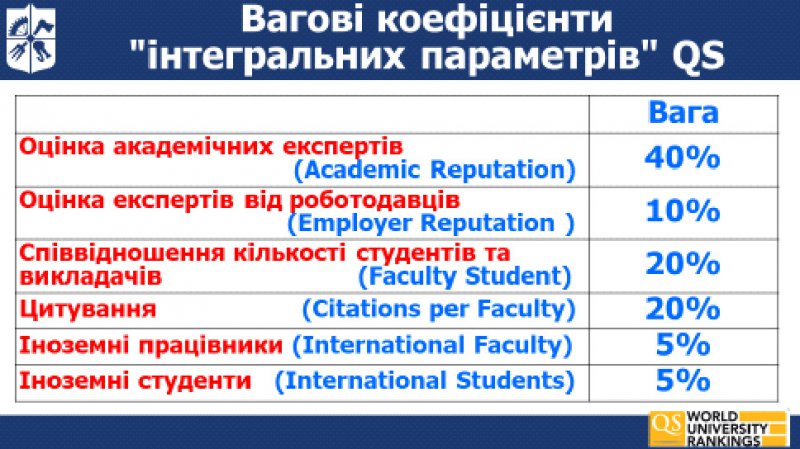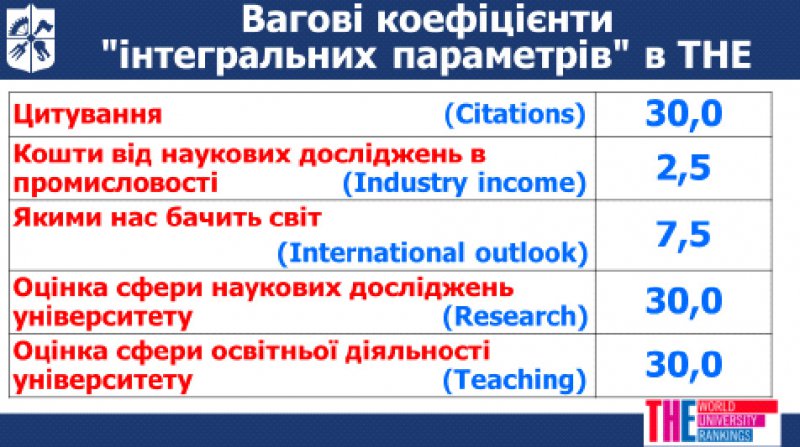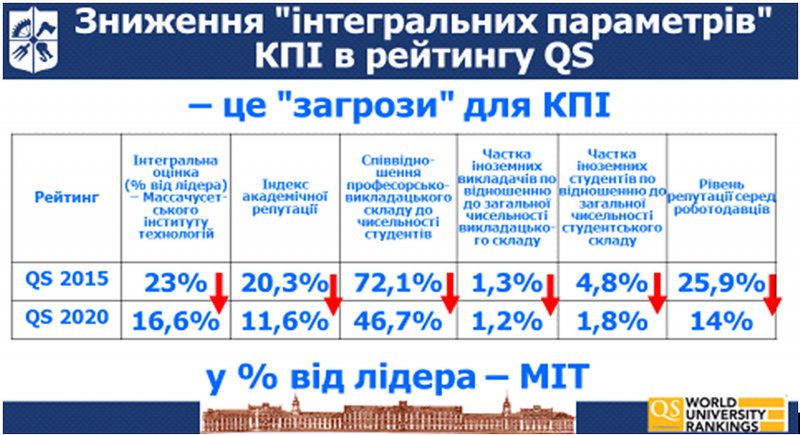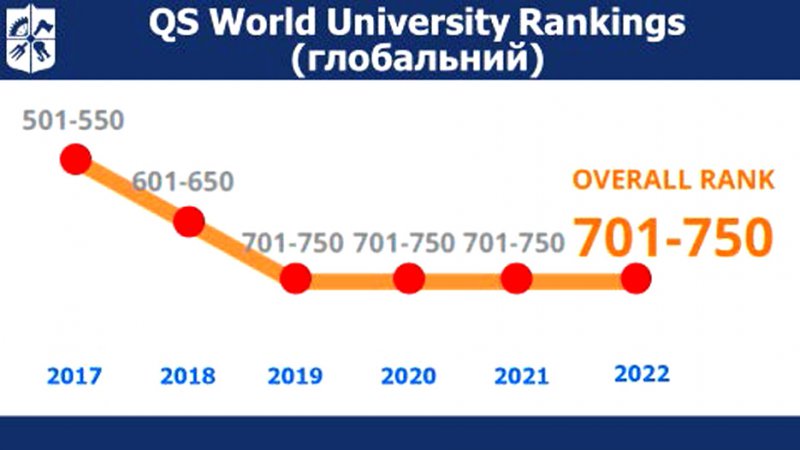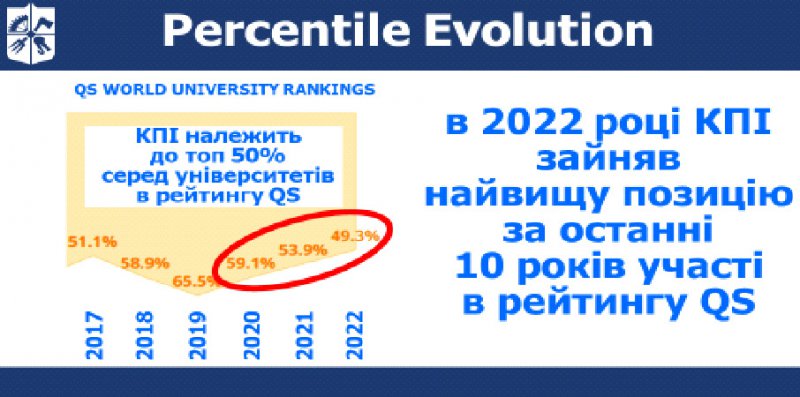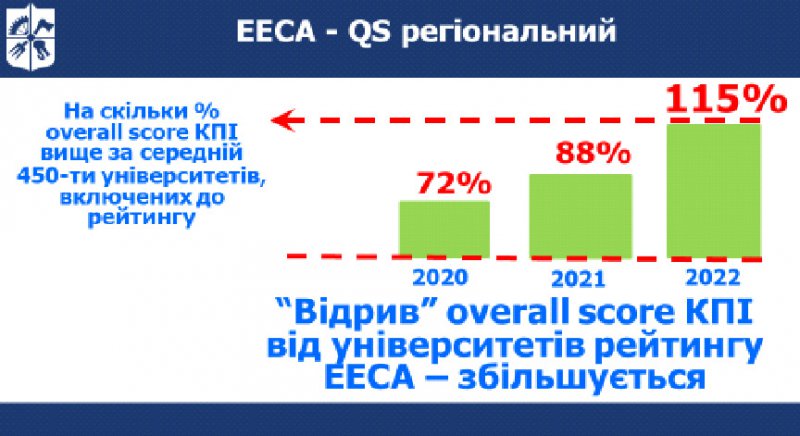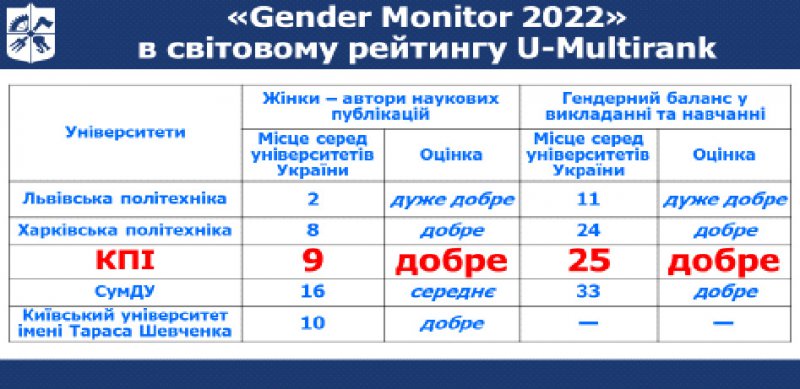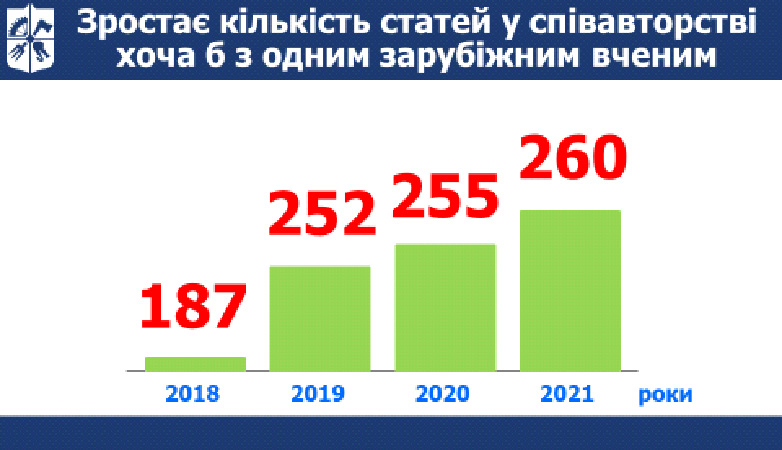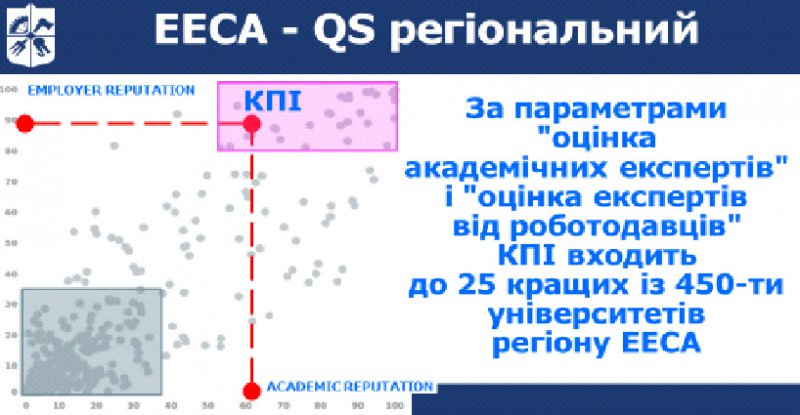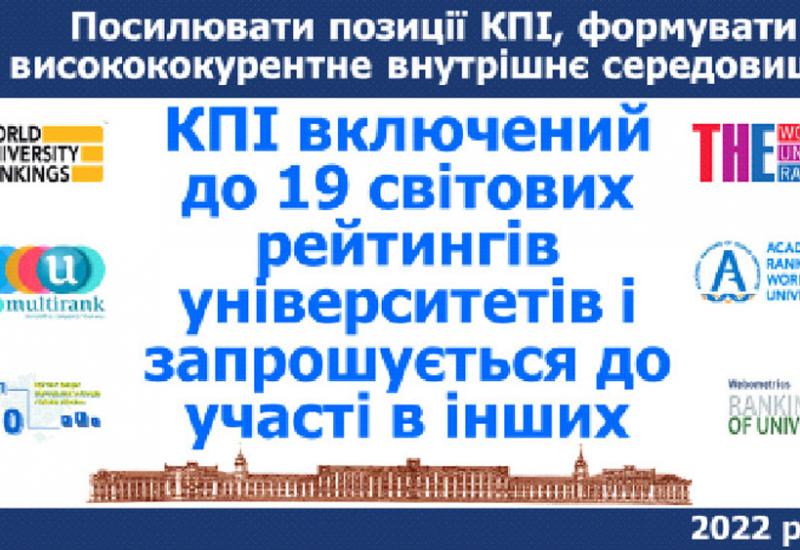World university rankings are becoming an increasingly important indicator of the position of universities in the highly competitive environment of international markets for educational, scientific and technical services. Therefore, for Igor Sikorsky Kyiv Polytechnic Institute, the task of improving its position in them is of strategic importance. The Vice-Rector for International Relations, Corresponding Member of the National Academy of Sciences of Ukraine Serhiy Sydorenko spoke about how the university is working in this direction and what else needs to be done at a meeting of the Academic Council of Igor Sikorsky Kyiv Polytechnic Institute on June 5. Given the importance of this issue for the university, Kyiv Polytechnic is publishing a summary of his report.
This report should draw attention to the important role played by KPI's participation in world rankings and what it brings to our university. We would like to talk about the role of rankings in the world system of higher education, about the periods of KPI's rise in them and the reasons for its fall, about the need to strengthen the work with ranking indicators in the departments, about the tasks of strengthening KPI's position in the world evaluation systems.
1. Rankings in the development of the world higher education system
World university rankings are becoming an increasingly popular service from year to year to determine the position of universities in the highly competitive environment of international markets of educational, scientific and technical services.
The Law of Ukraine "On Higher Education" stipulates that in order to obtain the status of a research university, a university must be present in world rankings.
The maximum contribution to the calculation of funding is given by KPI's entry into the top thousand in at least one of the following: QS, THE, ARWU.
The QS ranking uses six integral parameters:
1. Assessment by academic experts, which contributes 40% to the overall university assessment.
2. Assessment of employers - 10%.
3. Citation - 20%.
4. The ratio of teachers to students - 20%.
5. Number of foreigners: staff - 5% and students - 5%.
There are five integral parameters in the THE ranking:
1. Citation - weighting factor of 30%.
2. Funds from industry - 2.5%.
3. The level of internationalization - 7.5 %.
4. Expert estimates: research - 30% and teaching and learning - 30%.
The total score and rank are calculated from the integral parameters.
The integral parameters, as a combination of direct measurements and expert assessments, in a concentrated (compressed) form include: an assessment of the university's authority in the global system of science and education, the quality of services in these areas in global markets, whether the university is attractive to the world: do applicants and partners come to it? It also provides an indirect prediction: will such a university be successful?
2. Dynamics of Igor Sikorsky Kyiv Polytechnic Institute positions in world rankings. Growth in 2014-2018 and decline in 2018-2020
...the year 2011 was marked in the history of Ukrainian higher education by the fact that for the first time two Ukrainian universities (Igor Sikorsky Kyiv Polytechnic Institute and Donetsk National University) were included in world university rankings.
In the QS ranking in 2014-2018, KPI rose to its highest position - a place in the range of 501-550 - out of about 1,500 rated universities in the world.
But after that, it began to "sink" in all integral parameters, and in 2020 it "mastered" the interval of 701-750 places.
The low indicators did not correspond to the true potential of Igor Sikorsky Kyiv Polytechnic Institute and carried certain threats: they worsened the reputation, reduced competitiveness, and complicated the university's economy (with formulaic calculation of funding). Therefore, measures were taken to avoid this.
The requirements for quantitative rating indicators were taken into account in the profiles of departments, in individual ratings of the research and teaching staff, in contracts with managers of all levels, and this should have prompted work to improve these indicators, but a significant improvement in the integral parameters of the KPI could not be achieved.
3. 2020: transition to the kpi management system and strengthening of managerial influence on the performance of units
In 2020, a notable event took place - the transition of the university to a management system based on "kpi". This ensured an increase in the efficiency of the entire university system. At the same time, the task was to strengthen Igor Sikorsky Kyiv Polytechnic Institute's position in world rankings.
The main reason for the KPI's slippage was identified as the fact that for a long time the departments, faculties and institutes were actually "freed" from the need to analyze the dynamics of those quantitative and qualitative characteristics of their work that correspond to those requested from the KPI. Therefore, the task was to move from "observation work" to targeted managerial influence in order to strengthen KPI's position in the global evaluation systems.
The idea was to achieve positive dynamics in the departments for each of the characteristics that the raters demand from KPI. As a result of synergy, KPI's integral parameters and its position in the rankings will improve. This was recommended and explained at the level of faculties, institutes and departments.
Interaction with data from department profiles
The technologically implemented mechanism of influence by individual indicators looks like this. For example, the THE ranking considers the contributions of each faculty and its departments based on five integral parameters. It takes into account citations, research funds for industry, internationalization characteristics, and assessments of research and education. The data is extracted from the profiles of the departments; nothing is specifically requested from the departments for this monitoring. The head of the department and the dean of the faculty see weaknesses in the data. Therefore, the implemented monitoring is actually the basis for assigning tasks to managers on which performance characteristics should be improved.
The faculties and institutes are informed about all indicators, because the LCA ratings sector sends analytical notes with both an analysis of the characteristics of the departments' work based on the data from the department profiles and the results by subject categories that we see in the world rankings.
For example, only recently the results of global rankings QS and THE for departments within the subject categories of Engineering, Computer Science, Physical Science, and Economics, as well as the results of subject rankings and the results of the QS ranking in the field of employment have been sent to the departments. And this practice will be continued.
Thus, there are more than enough grounds for the departments to consider what exactly should be improved!
4. Some positive results
Thanks to the measures taken, KPI has strengthened its position in the rankings.
The slippage in the QS ranking has been suspended, which ensures a higher contribution of the international sphere to the distribution of funding from the Ministry of Education and Science. At the same time, KPI rises within the range of places - 701-750, and now has the highest position for all 10 years of participation in the ranking.
In the regional ranking of developing countries in Europe and Central Asia, KPI's overall score improved compared to the average in the group of all 450 universities included in the ranking. This means that KPI is improving its performance faster than others. According to academic and employer experts, KPI is among the top 25 universities in the region in this regional ranking.
The number of articles co-authored with at least one foreign scientist is growing, which is an important criterion of internationalization. This means that our research university is gradually integrating into the international scientific space.
All of this is the result of the targeted activities of vice-rectors in the areas of study, deans, directors, and heads of leading university departments.
But there are also many problems and unresolved tasks.
For example, KPI has not yet managed to enter the top thousand of THE.
5. Tasks of the university and departments to strengthen their positions in world rankings
What are the "tips" for our departments, specialties, and educational programs from the rankings? What exactly do we need to strengthen?
1. There is a deterioration of KPI's position in the parameter "International Students" (number of foreign students).
This parameter actually determines how attractive the university is to the world, to young people, and whether foreigners will come to study there.
"International Students" is the only integral parameter of KPI with a steady negative trend in recent years.
2. In the gender sphere of KPI, which is an important component of the democratization of the entire system of university life, KPI's position is assessed as "good" in terms of authorship of scientific publications by women and gender balance in teaching and learning. However, among Ukrainian universities, we are only on the 9th and 25th positions.
3. We should learn to work with the expert community in a new way.
In the QS, their assessments are almost decisive: the weight of academic experts' assessments is 40%, and employers' - 10%. Moreover, the QS rating selects experts for Igor Sikorsky Kyiv Polytechnic Institute from databases - from those who know us well, because the departments, faculties and institutes of Igor Sikorsky Kyiv Polytechnic Institute form these databases themselves.
And for those experts who seek their impressions from primary sources, we need high-quality English-language websites, attractive descriptions of educational programs and scientific achievements, and publications in recognized international journals. That's why quality websites are so important!
Here's an example of website improvement. Although the faculty website of the Faculty of Radio Engineering ranks 16th in the university Webometrics ranking, the websites of the Department of Applied Radio Electronics and the Department of Radio Engineering Systems rank 93rd and 79th, respectively. Therefore, there is only one action to be taken: to make the websites of these two departments better, to have their English-language versions.
A similar task is for the Department of Technical and Software Automation at the Faculty of Engineering and Chemistry.
And we have many more such examples!
But among all our tasks, the key one is to move away from the "observation position" and move to managerial influence.
The ratings for individual indicators of the methodology show us what we should "put our hands to", what exactly needs to be improved in certain subject categories and in individual subjects.
For example, the overall KPI scores in subject categories from academic and employer experts fall within the range of about 50-70% of the overall score of the leaders - MIT, Harvard University, University of Cambridge.
So we have something to work on.
Reflecting on the advice contained in the world rankings, let me conclude by drawing your attention to the main point.
Rankings push us to improve our working methods to enhance the competitiveness of the internal environment and, thus, to strengthen our scientific and pedagogical potential (in terms of scientific and pedagogical potential, we have been losing to Taras Shevchenko National University of Kyiv for 14 years). Strengthening the staff, scientific and pedagogical potential is the most important component to ensure a synergistic effect, which, thanks to the work with the rankings, should lead to an improvement in the life of our academic community!
By the way: On June 12, the Center for International Projects "Euroeducation" together with the international group of experts IREG Observatory on Academic Ranking and Excellence presented the seventeenth academic ranking of higher education institutions of Ukraine "Top 200 Ukraine 2023". Igor Sikorsky Kyiv Polytechnic Institute took the first place. When compiling this year's ranking, experts used multi-criteria approaches to assessing the effectiveness of universities based on the processing of large amounts of data on the work of higher education institutions obtained from open sources. The basic principles for determining the rankings of Ukrainian universities were the following: ensuring openness, transparency, objectivity and independence of university rankings; taking into account the comprehensiveness and diversity of their activities; priority of European integration processes (with the weighting of international university performance indicators (QS World University Rankings, Times Higher Education World University Rankings, THE University Impact Rankings and others) set higher than the weighting of national indicators).
